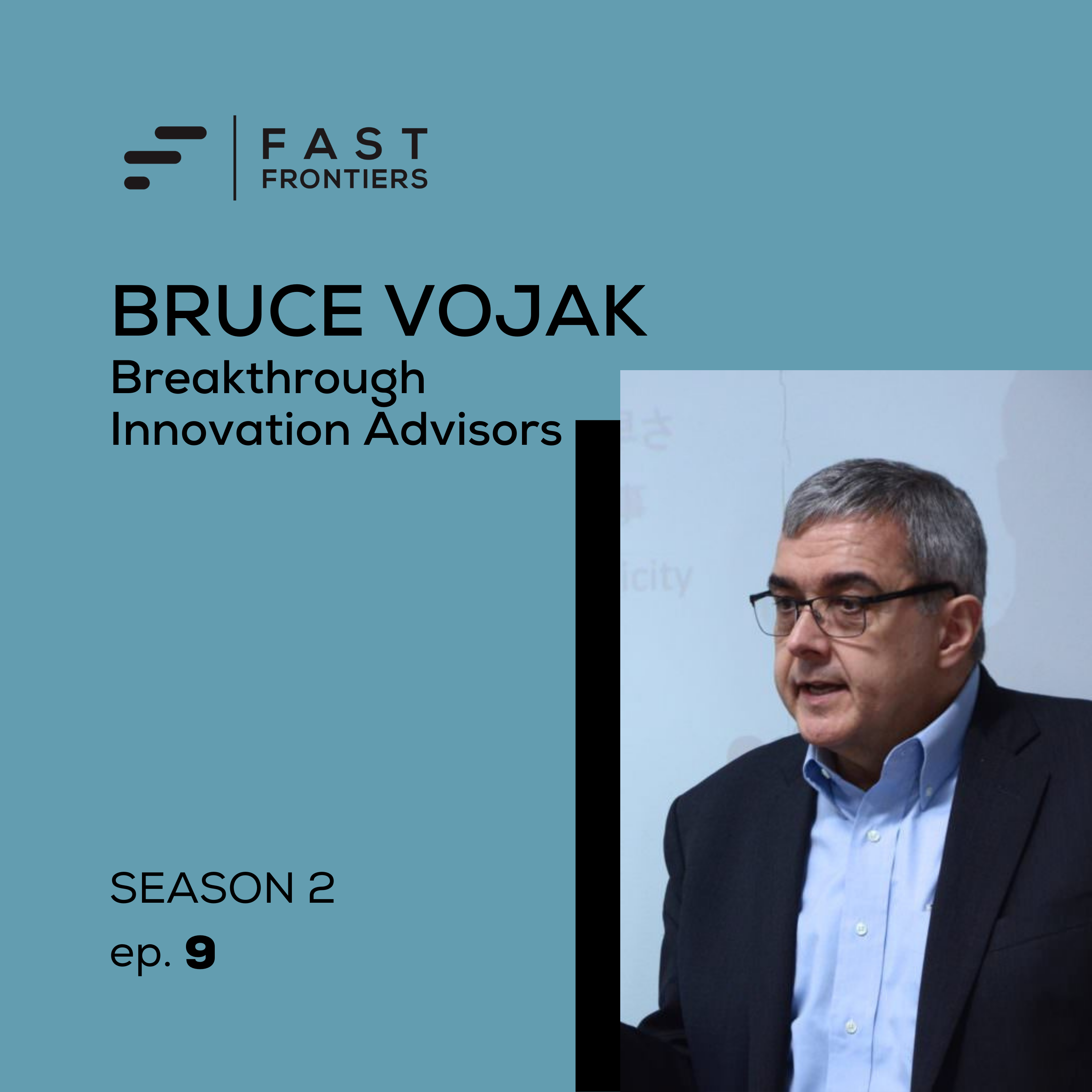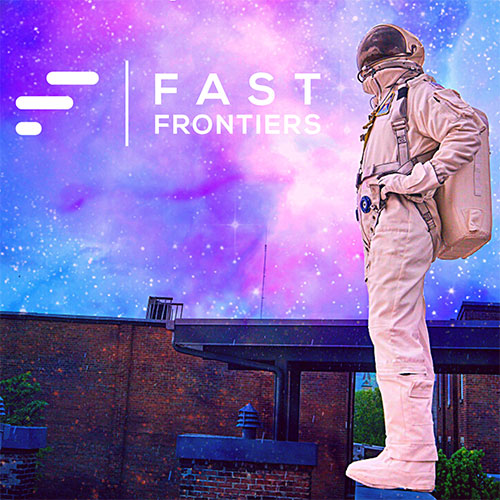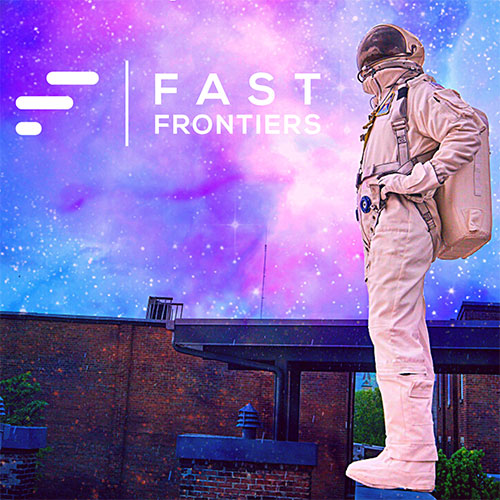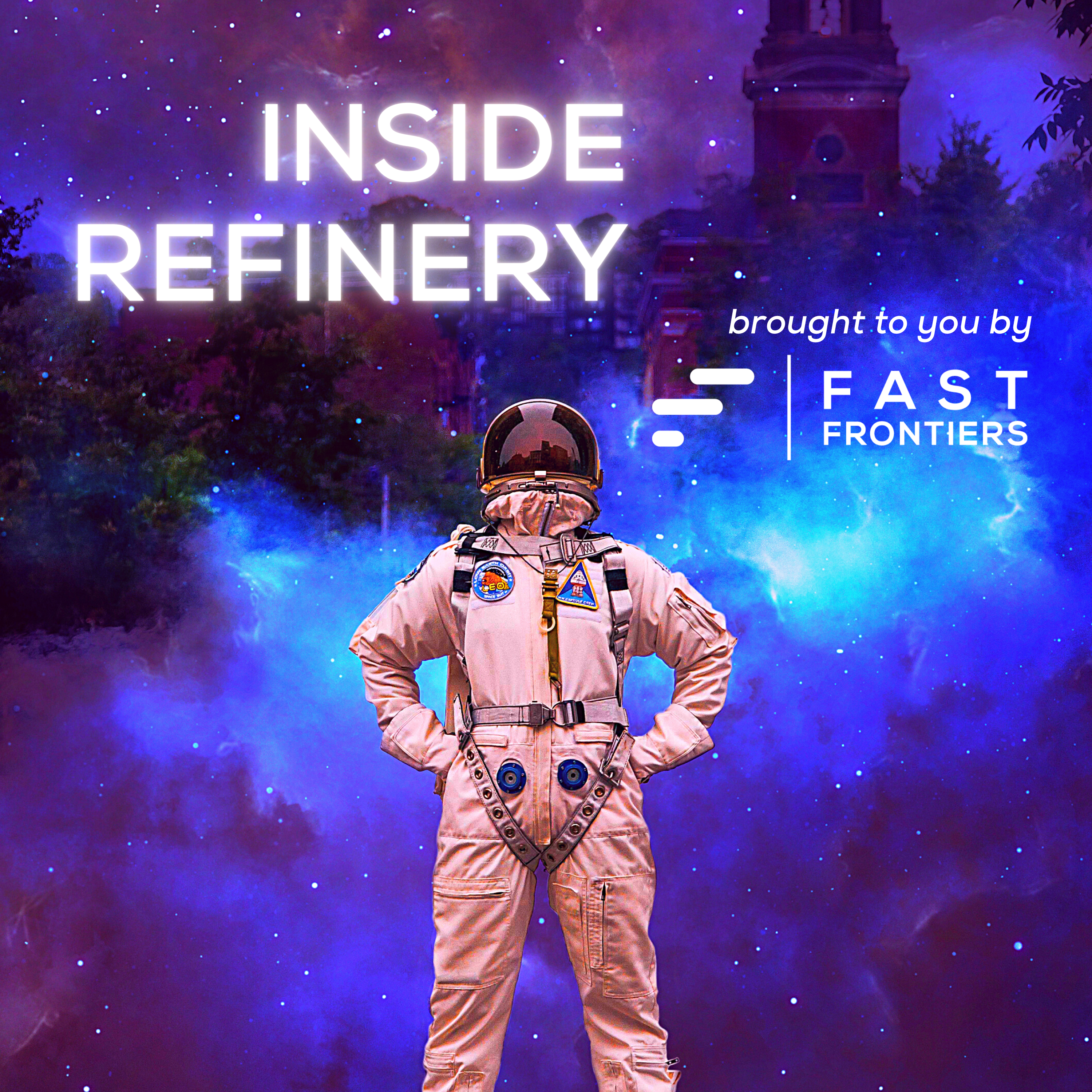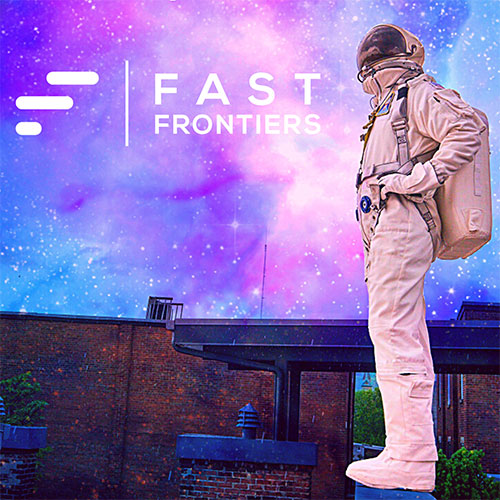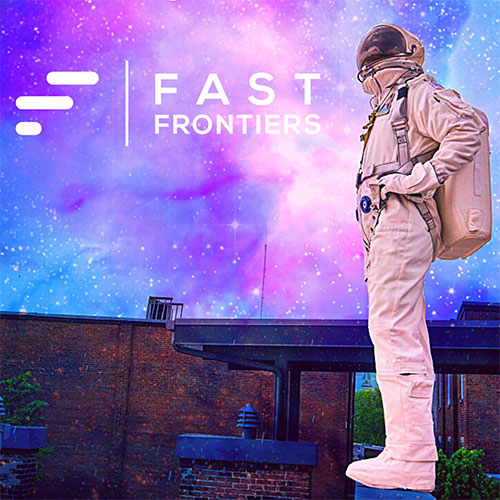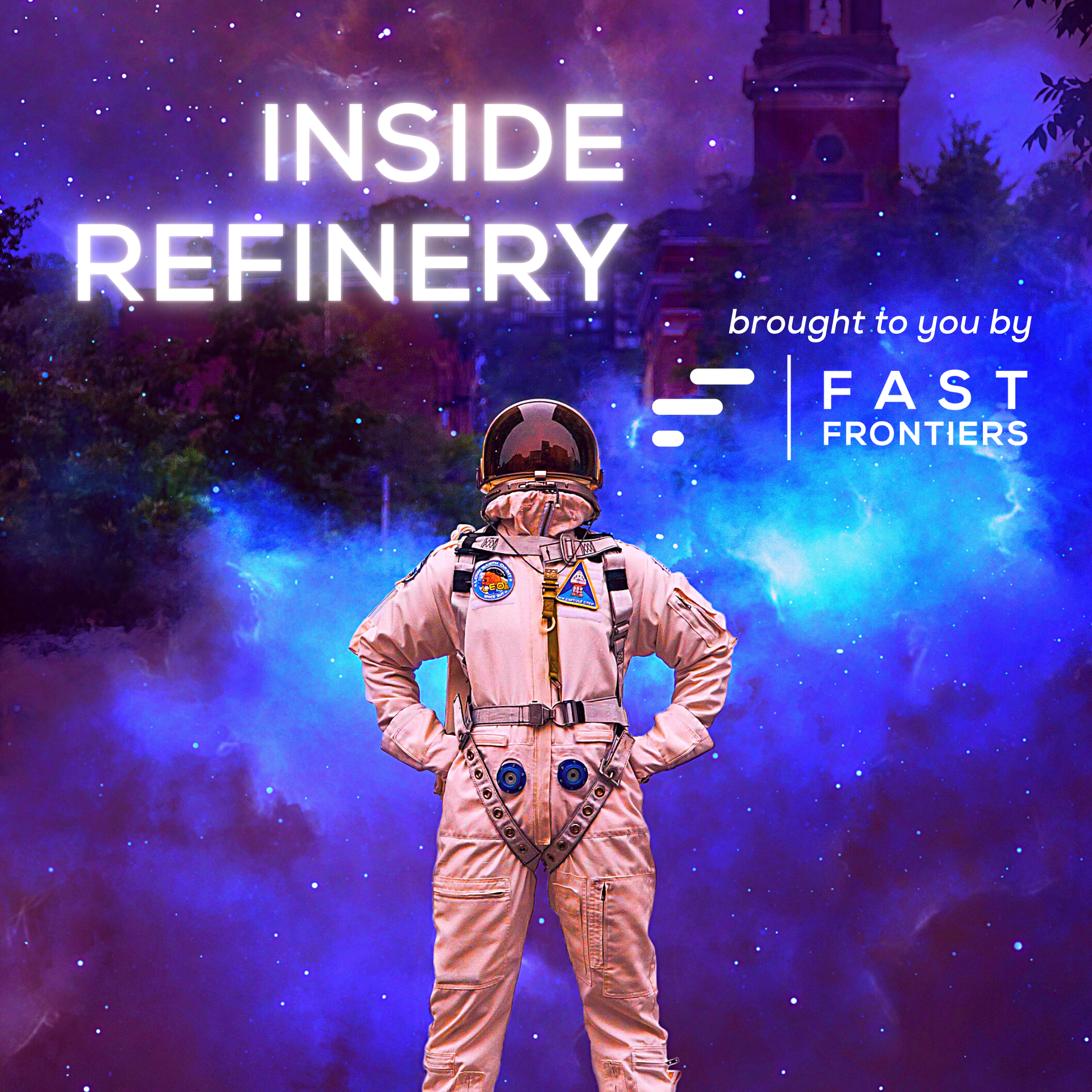S2 Ep 9. Bruce Vojak: Breakthrough Innovation Advisors
- 0.5
- 1
- 1.25
- 1.5
- 1.75
- 2
TIm Schigel : Welcome to Fast Frontiers. I am your host, Tim Schigel, managing partner of Refinery Ventures. In today's episode, we're bringing you my conversation with Bruce Vojak researcher, author, and managing director of breakthrough innovation advisors. In today's episode, we're going to dive into some of Bruce's learnings that came out of his writing, Serial Innovators. Bruce and his coauthors immerse themselves in the problems of a people view of innovation, rather than a process and structure or cultural view of innovation. We're also going to dive into the concept of VUCA, V-U-C-A, which stands for volatile, uncertain, complex, and ambiguous, a term that came out of the military. It's a concept that is invaluable to help you navigate and excel, even in the middle of chaos. Biggest theme or so what that I hope you take away from this conversation is that VUCA is best utilized as a power tool for companies giving them a framework of sorts to help accomplish innovation goals, amid chaotic markets. It fits so well with the theme of Fast Frontiers, as innovation is happening faster and faster. Perhaps we need to add another letter, AVUCA, for accelerating volatile, uncertain, complex, and ambiguous. Perfect descriptors of today's present world, isn't it? Bruce Vojak is an author researcher and consultant. He coauthored, Serial Innovators, how individuals create and deliver breakthrough innovations in mature firms. Bruce also serves on the board of directors at Medtronics, the advisor board of JV Partners and on the board of Micron Industries. He consults with major corporations like Procter and Gamble, and is the founder of Breakthrough Innovation Advisors. Bruce has also served as associate dean and adjunct professor at the college of engineering at the University of Illinois in Urbana- Champaign. Early in his career was director of advanced technology for Motorola's non-semiconductor component business, where he held research and business development positions. Bruce has a bachelor's of highest honors, master's, and Ph.D. degrees in electrical engineering from the University of Illinois and an MBA from University of Chicago. Please enjoy my conversation with Bruce Vojak. There's so many different topics I'd love to explore with you, but first let's just talk about kind of what led you to that book and getting together with your colleagues there in terms of Serial Innovators. How did that come about?
Bruce Vojak: Yeah. It's an interesting story, Tim. When I went to work at the University of Illinois, it was a mid-career change, early forties. In addition to my administrative role, I took on some adjunct responsibilities to do some teaching and research. When I was trying to decide what direction to go with the research, I got some really good advice from a department head, Harry Cook. He said, "Just explore some things you're familiar with." I thought, how have I spent the first half of my career? It was with primarily large organizations and looking to try to diversify or renew them and move in new directions. My interest started from that point and through a couple of serendipitous interactions, I started collaborating with Ray Price and Abby Griffin, and we worked literally 10 years on various research projects before we wrote the books. We really had immersed ourselves in these problems of, if what I might call a people view of innovation rather than a process view or structure view, or culture view of innovation.
Tim Schigel: That's great. I love that. We've invested in and I talk about human capital, not HR, but the importance of human capital going forward in companies. One of the things I think you pointed out was that all the research on innovation has taken this perspective that you can manage that process.
Bruce Vojak: Yes.
Tim Schigel : That it was like a pipeline, do these things up front. Then predictably innovation comes out the back end and that's not true, is it?
Bruce Vojak: Well, it's interesting. I'm in the middle of writing some things up. Your timing is uncanny because literally, just yesterday I was trying to work through how to articulate this and hopefully that'll help today. In a nutshell, a lot of these processes can be helpful. They can be really helpful. People who talk about design thinking, people who talk about phase, gate processes, and things like that, and even developing roadmaps, these are all good tools and processes, but while they help you, they won't guarantee success. If you don't have those, you're likely going to either be very inefficient or unsuccessful, but having them will very likely not guarantee success. This is where the people come in. It's kind of like saying, "I'm a world-class chef, but I also have a few recipes in a book on the side." The recipes help you, but the world-class chef knows how to go in. If you will season to taste and that's what a lot of innovation looks like. It's that human side.
Tim Schigel: That's interesting. Yeah. I use often for innovation taking place in other regions, example of LeBron James and the Cavs. The Cavs had all the components for success. They had all the ingredients. They had the coaches, they had the money, they had the fans, but you needed the catalyst.
Bruce Vojak: Yes.
Tim Schigel: The catalyst was LeBron and that was unpredictable. You couldn't plan for that.
Bruce Vojak: Without him, you likely weren't going to make it happen.
Tim Schigel: Exactly. Exactly.
Bruce Vojak: You couldn't guarantee it with him, but you had an infinitely better chance.
Tim Schigel : Exactly. It's like, what are those catalysts look like? How can you spot them? I also have an electrical engineering degree, but only two letters. A lot less time than you spent from Case Western Reserve University. When I was picking a major, I picked that because I knew the world was going to be more complex and technology-oriented. I didn't know what I was going to do, but I thought having an understanding of the physical sciences was really important. What role does that play in informing your views and perspectives on innovation, having that technical background?
Bruce Vojak: It's actually kind of, again, another fascinating question. If you look at the three of us who collaborated on the earlier book, Abby Griffin, Ray Price, and myself, Abby, and we all brought PhDs, if you will, to the problem. Abby and I both brought MBAs, but Abby came very much from a marketing and product development background. Ray came from an organizational behavior background and I came from a technical background. We came with three very complimentary views of things. One of the things that impressed me by the people we interviewed in the study, was that I'm going to say very few had, let's say PhDs in a technical area. They were very often people with bachelor's degrees in engineering or science, just amazing inside ability to connect the dots, to see patterns, to see trends. While they didn't carry, if you will, that credential of background, they were clearly the kind of people that could see and do things that other couldn't. Now, I will say that most of the companies we looked at were what I would call technically enabled. They weren't necessarily high tech companies. They weren't ones that were founded based on technology, but they were enabled by it. The people that we looked at were, again, very impressively able to work with those technologies. My background initially was to look for technology and I'll say now, I'm infinitely more open to very different business models and business innovation, if you will, because there are so many different ways that a company can go about doing those things.
Tim Schigel: That's what I like about startups, is you're basically starting with a clean slate right from the beginning every time. You're designing the organization from scratch and you rarely get to do that inside a big company.
Bruce Vojak: Well, in fact, just the opposite. You have many more constraints as a big company.
Tim Schigel: Right. Back to the engineering understanding and sort of there's a lot of physics involved in electrical engineering. When you apply that to the process of innovation, not the innovation itself, but the process and knowing what things like, whether it's chaos theory or emergent properties of complex systems and how that plays into the innovation process and your conclusion or findings that innovation is not a highly managed process or it's difficult to be. That must give you some...
Bruce Vojak: It does. Actually, you couldn't have framed this better for me, so thanks. One of the things that has struck me, and this is outside of the work that I did with Abby and Ray, but I've looked at what I kind of refer to as, and it is the, epistemology of innovation.
Tim Schigel: I wanted to use that word. This is my chance to use the epistemology. Come on.
Bruce Vojak: I get regularly told, you got to stop calling it that, even though it is, you got to stop calling it that.
Tim Schigel: People like me will like it. We'll geek out on it.
Bruce Vojak: Really the philosophical understanding of how people come to know. I've spent a lot of time trying to get my mind around, if you will, what does it mean when innovators come to know things? What I found is that my background, if you will, in applied physics has been incredibly helpful because one of the things I realized, and I will try to keep this concise, there are two patterns in how people approach knowing things. There's what I would call a very modern view and modern as in the last couple of hundred years, where people come in a problem and they detach themselves from it. They break it into its pieces and they try to linearize it. If you've ever looked at the problem of how a pendulum works, you step away from it, we don't interfere with it. We break it into its basic elements, the mass and the gravity. We linearize it. We don't look at the whole range. That's really how engineering and science is taught. In fact, as an aside, Tim, I'll mention this here in this recording, that Dave Goldberg, who introduced us, has made great effort in really trying to understand, and let's say change or adapt engineering education. What I'll say, these ideas of being detached, being reductionist and how we solve a problem and being linear, is really the foundation of all undergraduate engineering programs. It's the ticket, if you will, to get into a company or a startup if you're going to work in anything tech-related. The difference though, and this is modern view. The difference though is that there's another view. I would say it's not post-modern because that carries other connotations of kind of, to me, randomness almost.
Tim Schigel: Modern was really, as Dave Goldberg talks about, is more industrial modern.
Bruce Vojak: Yes. That's when can I tell you, thank you. That's right. When I know inaudible, I talk about Descartes', if you will, going forward. The way of addressing problems, and yet in this other view, which is the one that I see relentlessly in the innovators, instead of being detached, they're very intimately involved in understanding the problem. Instead of being reductionist, breaking it into its elements, they look at it holistically. Instead of being linear, they look at it very non-linearly. These are two almost diametrically opposing views of the world. What I find fascinating is, is the one is the ticket in, but the second one, which is so, so very rare, is the one that really distinguishes the ones that may appear to be innovative from the ones that truly are innovative.
Tim Schigel: It seems like it's almost as, or not almost, but is as fundamental as kind of Newtonian view of the world, versus the relative and inaudible quantum view of the world crosstalk or biological. Instead of machine metaphors that we use during the industrial age, we're now going to use biological/ neural metaphors, Which is more connected, massively connected systems.
Bruce Vojak: Yes. You used the word emergent and chaos, and meaning to me, mathematically chaotic, which is a good thing, not random. Your metaphor of life sciences, if you will, is great because you really can't reduce that to its underlying physics and still return to the life. There's something missing, if you will, between those two levels. That's the beauty of emergent behavior. That there's something that when it all comes together, there's something more than just them being there and you even hear it in the language the innovators use. They often talk about, I see fuzzy things in my mind's eye. I connect the dots. I just would love to hear their stories because you could hear them talking about these things as they discuss their experience.
Tim Schigel: Right. It's more emotional, intuitive leaps.
Bruce Vojak: Yeah. It is intuitive. I'll go just briefly back to the work of Michael Palani, who is not all that well-known, but he's the one who spoke of tacit knowledge and tacit knowledge is very, very misunderstood today. As an aside, people think of tacit knowledge is something that we need to make explicit. That's not the case. Tacit knowledge truly is this un-articulable way of knowing things.
Tim Schigel: Tactical knowledge.
Bruce Vojak: Part of a can be tactical actually, yes. It can be. It's this integrating without being able to articulate it. What happens actually, you mentioned tactical, very often what happens is people rely so much on their brains and not on other senses that they lose a lot in really knowing things.
Tim Schigel: Therefore, can this innovation process, or can an innovator... Are Innovators born or are they taught?
Bruce Vojak: Yeah. We had actually, I'll come at this a couple of ways. We had done a survey and asked people just exactly that question among other questions. nobody said that they could fully be taught that way, but when you went to the other end of the spectrum, they kind of stopped short of being fully born too. I'd say that what I've observed is that you can encourage creativity. You can give them some ideas about what patterns exist when creativity occurs. You can help them see things that they might not normally have seen and think of things in ways they might not normally have thought, but can we make a production line to do this? I'm not yet convinced because I have to tell you, the people that I see who do it are just remarkable and really quite different. Typically, they begin to emerge in kind of the, I'm going to say five to maybe by 15 years in an organization, you've pretty much begun to see these patterns. We'll use more metaphors here, like a Sommelier. You can tell what's a good wine. The right managers or other serial innovators can actually identify these at times, by just seeing patterns of behavior.
Tim Schigel: A lot of analogies to music as well. We were just talking about it. I play guitar, Goldberg plays guitar, and some of the best guitar legends didn't necessarily know the theory. They didn't. Matter of fact, that probably would have slowed them down.
Bruce Vojak: Yes.
Tim Schigel: They were making those intuitive leaps. They were connecting things between what they were hearing in their head and their fingers.
Bruce Vojak: Yes. Yes. Again, I want to be really clear. I'm not making this an either or versus the process.
Tim Schigel: Sure.
Bruce Vojak: I don't want to pan the process because that really would be damaging really to the insight.
Tim Schigel: Your focus has been primarily on large corporations, big CO's as we like to call them. What do you think the advantages and disadvantages, if you were to compare startups, venture backed startups versus big COs?
Bruce Vojak: Yeah. let me just briefly add too. Tim, I don't know if we even had a chance to share this. Over the last, I'd say five plus years, I've also worked a lot with small and medium-sized mature companies. Again, not startups, but all on the mature side. various different sizes. I see a lot of the same patterns actually in the small and medium-sized companies. One of the things is that like a startup, they have more opportunity to be agile, if you will. They have a little more opportunity to turn and move. The standard differences between a large mature company in a startup, and a large mature company... If you think about it, they're optimized, and for good reason, they're optimized to make products that are reproducible. They're looking to do things that are trying to make a process that's stable. These are all good things. These are things that if you went back to reading Adam Smith, The Economies of Scale and Scope, you'd say, "Yes, the large company is doing exactly what it should be doing." The problem is, is that if that culture is left as it is, to become mature and you don't renew it on a periodic basis or regular basis, it will ossify. That's where startups can have an advantage. Now, again, if a startup is a technology push and they really don't identify real customer needs, they'll lose for their own reasons. The thing about these innovators that we interviewed on our research, Serial Innovators, is that they took a large company and they were able to not only see opportunity that most wouldn't be able to see if you will or have the skillset to, but they also saw within the company how to navigate the company. That's tricky. It's hard enough to move a group of 10 people let alone hundreds of people.
Tim Schigel: It's a special skillset that has a lot more with crosstalk behavior and politics, perhaps.
Bruce Vojak: Yes. it's a special appetite to be even willing to do that. In our experience, it goes back to people who really wanted to serve the customer. It's beautiful. They want to serve the customer. They want to serve the shareholders. They want to help their colleagues, keep their jobs and retire with good retirement packages. They're kind of pouring themselves into it. It's beautiful to watch when you see it.
Tim Schigel: I'm a big customer driven design fan. That's what I look for in companies we invest in and you look at something like Uber. When Bill Gurley was going to invest in Uber, say, "Hey, this is a great service for consumers." I'm sure in the part of his investment memo where he talked about risks, he's like, everything. The government's going to come. What you can conclude is that those risks are worth taking because you're doing it on behalf of the consumer. The consumer clearly sees it as a benefit and advantage. If that's true, you can just about take on anything, in terms of other challengers and forces. Yeah.
Bruce Vojak: Even if part of the market sees an advantage. A big enough part of the market that will get you going, that's really all you need to get started.
Tim Schigel: Yeah. Then that will pull through the rest of the innovation to serve that that unmet need perhaps. One of the other things that you talk about or mention is a VUCA. I'm a big fan. Let's first talk about if you could share what is VUCA and how you came to understand, or know what VUCA was.
Bruce Vojak: VUCA is volatile, uncertain, complex, and ambiguous. Now, I've got to frantically, see if I can define these properly on the fly with you. Volatile, we've lived in a very volatile year here in 2020, I'd say, that month to month, week to week, day to day, things are changing constantly. Volatility looks like that. Uncertainty, again, we've lived in that, not knowing what will happen if you will. Tomorrow complexity. We talked about just a moment ago about having large systems that are viewed holistically, where a very small change in one part of a system can have a huge change somewhere else. One slight change in a performance characteristic could make or break, if you will, the entire product or market, and then ambiguity has to do with what do we assign as meaning or understanding for something? You and I both might look at a market and you may say, "Well, I understand it's happening for this reason. The market is declining because fewer people own specialty guitars," let's say. I'm truly making this up, out of my league, and I might say, "Well, the market is declining because people have less money, less disposable cash." That ambiguity has to do with, even if we both see the same pattern or trend, how do we understand it? VUCA originally grew out of discussions in the military and the defense industry. It's a wonderful set of descriptors because between all four of those, you really define, I'm sure I'm not inaudible at the fog of battle, but also the fog of, if you will, competition in any industry, whether it's a startup or a mature company. that's my understanding of VUCA. I thought it just fits so well that I've kind of appropriated it to variously when I described the work that I do with companies.
Tim Schigel: What would be a good example of a project you've taken on where you've used the VUCA framework to understand a situation?
Bruce Vojak: The company I work with that that builds automation equipment. They help other companies build production lines, and they were engaged with the client in the last year or two that had, just for their industry, for the automated equipment industry, they had a remarkably VUCA environment. Usually an industry like this, a company like the one that I work with, they're given a set of specs and the company either designs to those specs. They're given a design that the company builds to those specs. In this instance, they were actually told, this is the end goal. We want to have a production facility that looks like this. You're one of, I don't know, dozens contractors to come in and we'll tell you what we want the end product look like. We'll tell you where you're working in this, but you're going to have to work out not only with us, but also with the other contractors upstream and downstream to figure out how we can do this, to make the whole system. There's volatility of from day to day, not even knowing exactly what's on your plate. Uncertainty about the specs and product definition. Complexity because it changed several steps up or down process could affect your process and ambiguity, again, just kind of came with the territory. it was much more a matter of, when I talk about VUCA, it's encouraging companies to embrace it because there is this tendency to want to not do VUCA and that's okay. When you do that, what happens is, is you're very much becoming mature and you're not able to adjust or renew it.
Tim Schigel: It's back into that industrial reductionist linear way of thinking?
Bruce Vojak: It serves an important person or a purpose, but there's another word I should have used earlier in this. There's a lot of talk recently about ambidextrous organizations, being able to both work in that mature style, but also be able to renew. In a way, trying to encourage a company to take on those things. This client actually, independent of my prompting and they took it on. Part of the work I did with them is to document a bit of what they were doing and how they were trying to address it. An amazing group. They just on the fly. I guess I can mention the name of the company, at least. It's West Tech and it's part of JVA partners. They took on things that I'd say others in their industry would be very reluctant to take on and they just rolled with their sleeves and they did it. It's just fun to talk to them and fun to watch. When I say fun, I mean, there's financial and commercial results too. It's not just entertaining me, if you will. To me, that's how I define fundamental, that there winning.
Tim Schigel: Exactly. I was doing a little research on VUCA and saw that Bill George, a senior fellow Harvard business school, has kind of a corollary, VUCA 2.0, he calls it. Bob Johansen calls it VUCA Prime, but the corollary is vision, understanding, courage and adaptability.
Bruce Vojak: Ah. I'm going to have to look this up after we're done.
Tim Schigel: Yeah. It's great. I think at any company, big or small, new or old trying to survive the next 10, 15 years need to hire the human capital element to embrace that, because otherwise you'll be lost and you won't be able to keep up.
Bruce Vojak: Oh, the next 10 to 15 weeks or months.
Tim Schigel: Yeah. I started thinking about this podcast, about the acceleration of innovation. These innovations happening faster and faster. Perhaps we need AVUCA, which is an accelerating volatile, uncertain, complex, and ambiguous world.
Bruce Vojak: Yeah. Well, and it's funny that you say this. I'd done some work with the conference board and John Metselaar, who's my one contact there on innovation. He talks about, we're in the mode of VUCA on steroids. I'd say, it's exactly what you're describing. It's just up a notch or two or three.
Tim Schigel: Google has the 20% rule, where you're basically trying to get a large percent of your employee base thinking creatively or innovating in some way. Then the opposite, which is the Skunk Works, are a select group of people that are in the "innovation group." Have you seen any differences in those approaches?
Bruce Vojak: Yeah. In fact, the people that we saw were actually what I might call a third way, because the people that we identified in our research, and again, we asked our network contacts, "Hey, can you tell us about people who have taken an idea to the marketplace, that's really had a significant impact on the industry and on the company?" A billion dollar revenue impact, if you will, annual revenue for a company that's 20 billion or 30 billion in size. Somebody who really had made a noticeable difference. What we found is, while, there were Skunk Works in those organizations, some of the organizations, not all, and there were in some of the organizations, these 20%, if you will, guidelines or opportunities. The people who made the big things happen didn't really necessarily come from either of those approaches. The Skunk Work can have a challenge or a difficulty in that it's removed from you really are removed from the marketplace in many cases. I'm a big fan of the discipline of the marketplace. We've talked, you and I, just earlier in this conversation about design thinking and kind of a design view and this idea of intimately understanding customer and consumer needs just so important. I think that the more you separated out the bigger challenges than to bring it back in. Now, then I'll go and they'll say, "What about this 20% rule?" I'll say, "It's fine, but the people who really have these big impacts are maybe, one in 300 or one in 600." In fact, my colleague Ray Price had a friend tell him that, believe that this is a joke. Hopefully, I will tell it appropriately. if you had a company of 10 engineers, one would be an innovator. If you had a company of a hundred engineers, two would be innovators, and a thousand engineers three would be innovators. Then the person said, "Well, of a company of 10,000, how many would be innovators?" The other engineer would actually say four. The answer really was none because you driven them all out. In a large company, I think it's not unhealthy, but you can't expect that billion dollar result from these 20% programs. The people who really won, were the ones that were embedded in the organization, but they took on the challenges of being in that organization. They didn't need to be pulled out in a Skunk Works.
Tim Schigel: Finally, on that topic, what about the role of M&A? You see a lot of traditional companies wanting to be innovators. We want to be like Google, and if you look at Google or any of the other tech companies, they acquired YouTube. They didn't create YouTube. Google hasn't really created anything since Search, organically. it seems like so many folks don't necessarily understand that. What's the role of M&A? What have you seen the companies you've worked with?
Bruce Vojak: Yeah. It's interesting, because I actually worked, when I was at the Amoco Corporation, I was in an M&A group for about three and a half plus years. I'd say that if it's a mature company, that's doing the acquiring, it becomes very difficult to integrate an acquisition. You mentioned Google. I think they're able to do it because their culture and their expectations and everything, the organization is much more in line with the startups. When you have companies that have been making Earth moving equipment, let's say acquiring, and I'm just making this up, but acquiring a high tech company, I think it becomes just difficult for both parties. It even becomes difficult to price and to set a value style, let alone to realize that value and bring it into the company. I don't need be negative and fatalistic. I'm just saying it's a real challenge.
Tim Schigel: As you think about the pace of innovation, how innovation is changing or may change in the next several years, is there a question or set of questions that you are still asking, that you want to get the answer to? See how innovation works or something that's just still needs a lot more research that kind of... Anything nagging at you in terms of this process, from what you've seen in your career?
Bruce Vojak: Oh boy. This is a great question because I've spent the last several years looking at, as an aside again, after the large mature companies, I spent several years looking at the small and medium sized companies and actually some colleagues of ours in Japan, who again, Dave Goldberg introduced us to, and looked at Japanese innovators and they'd seen many of the same patterns we do. I'd say, I cannot look you in the eye and say, "No, it's a done deal." Since I'm so consumed right now, wanting to write up the results what I've found, I'm not looking to take an inaudible. That's probably an indictment against me. I think I might not sleep well tonight, Tim.
Tim Schigel : You need to be a little more curious, Bruce. It's a solid and good question. You've totally caught me flat-footed so I apologize for that.
Bruce Vojak: It's good.
Tim Schigel: I just figured there's so much to learn, so many things we don't know about this.
Bruce Vojak: Yeah, there are. I'd say maybe because at some level, I've grown comfortable over the years to say it's okay. That there's a certain point at which we can know. This goes back to the epistemology work that I did. The question is how much more can you appropriately know? I mean, I will say, I'll just use this to illustrate on it. It's not nagging at me, but people ask about machine learning and AI, and will that take over for innovation? My response is, well, it very likely may in some areas, but behind that, the world, I still think the people who were framing the questions and asking it. I still see it as this very human endeavor. In my complacency about these things, maybe I'm revealing a weakness that I should reconsider. In all seriousness, I mean, it's a good question. It really is.
Tim Schigel: Thank you very much for spending the time with me. I think this is a great conversation. I think our listeners are going to love it.
Bruce Vojak: Good.
Tim Schigel: Thank you very much. All right, Bruce, take care.
Bruce Vojak: Thanks, Tim. Take care.
Tim Schigel: Thanks for listening to Fast Frontiers. If you like our show and want to know more, check out our website, fastfrontiers.com. If you enjoyed this episode, please share it with others and give us a rating and review on your favorite podcast platform. Join us next week when we bring you my conversation with Niki Scevak, partner at Blackbird Ventures in Australia.
DESCRIPTION
Today we're bringing you my conversation with Bruce Vojak, researcher, author, and Managing Director of Breakthrough Innovation Advisors. We're going to dive into some of Bruce's learnings that came out of his writing, Serial Innovators. Bruce and his coauthors immerse themselves in the problems of a people view of innovation, rather than a process and structure or cultural view of innovation. We're also going to dive into the concept of VUCA, V-U-C-A, which stands for volatile, uncertain, complex, and ambiguous, a term that came out of the military. It's a concept that is invaluable to help you navigate and excel, even in the middle of chaos.
Please click on any related resources below for more information about what we discuss in this episode.
Today's Host

Tim Schigel
Today's Guests


